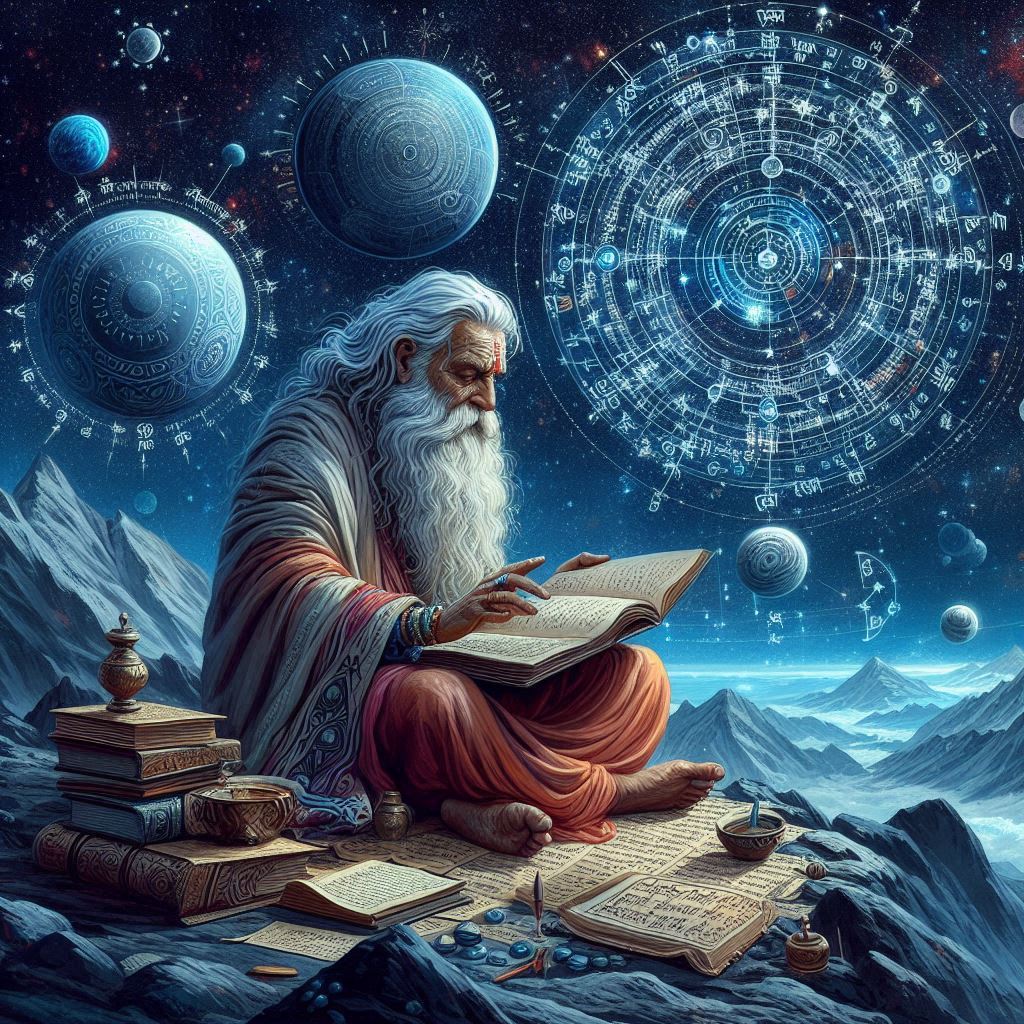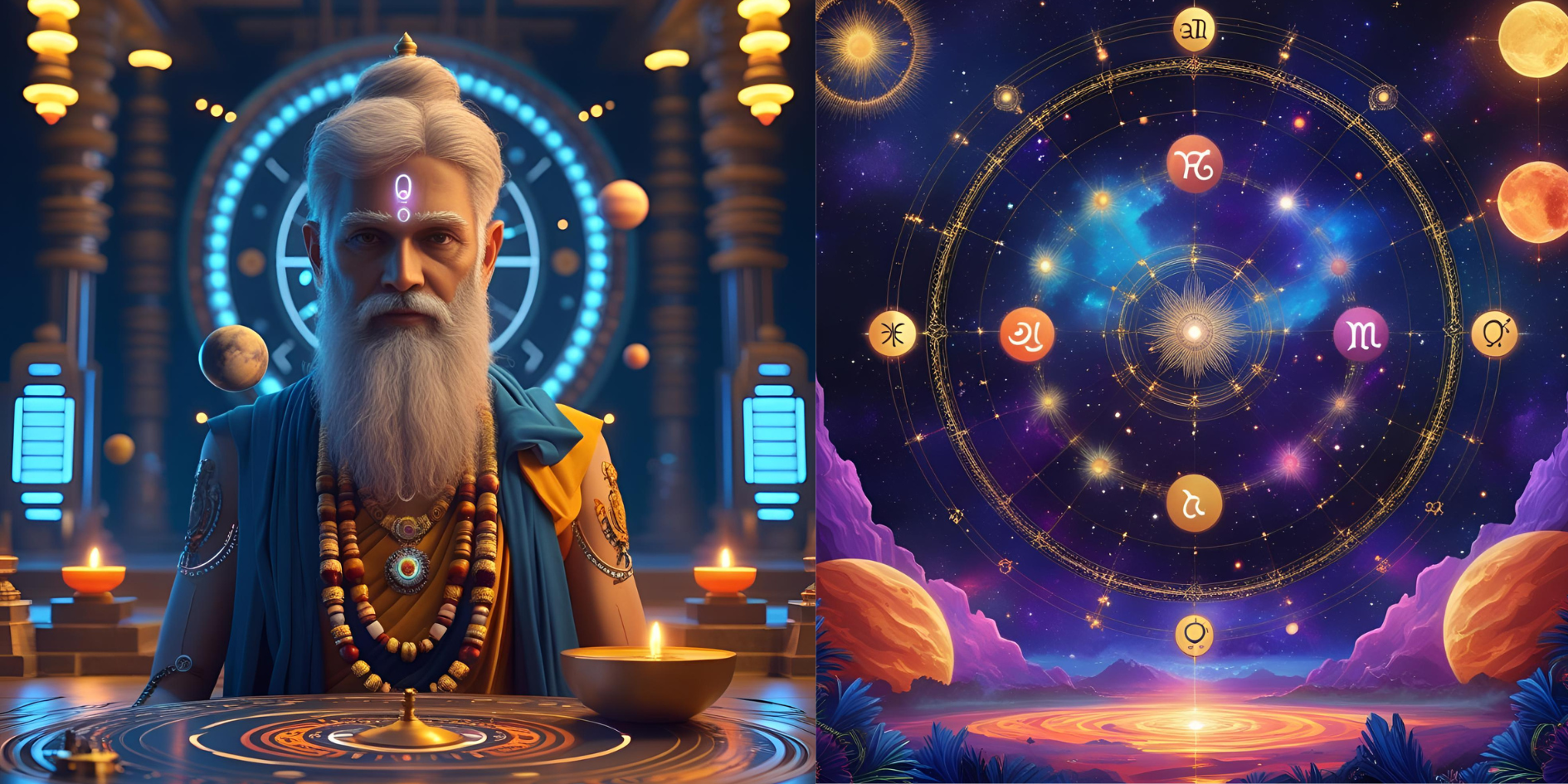Vedic Astrology, known as "Jyotish" in Sanskrit, is a profound ancient science that originated in India over 5,000 years ago. It involves studying the influence of celestial bodies—such as planets and stars—on human lives and the world around us. Unlike Western astrology, which focuses on the sun sign, Vedic Astrology places more importance on the moon sign and the positions of planets at the time of one's birth.
This ancient wisdom provides insights into various life aspects, including career, relationships, health, and finances, helping individuals make better decisions and find inner peace.
The Foundations of Vedic Astrology
Vedic Astrology is based on the concept that the positions of celestial bodies at the time of a person’s birth significantly influence their life's events, personality traits, and even their destiny. This is because each planet emits certain energies, which interact with each other and the Earth. These energies create a cosmic influence that shapes different life aspects.
Key components of Vedic Astrology include:
Kundli (Birth Chart): A birth chart, or Kundli, is a map of the sky at the exact moment and location of one's birth. It shows the positions of planets and stars in various houses and zodiac signs. The twelve houses in a Kundli represent different areas of life, such as career, marriage, health, and spirituality.
Zodiac Signs (Rashis): There are twelve zodiac signs in Vedic Astrology, each ruled by a specific planet and associated with unique traits. For example, Aries (Mesha) is ruled by Mars and represents courage and leadership, while Taurus (Vrishabha) is governed by Venus and signifies beauty and material comforts.
Nakshatras (Lunar Mansions): Unlike Western astrology, Vedic Astrology also emphasizes Nakshatras—27 lunar mansions that divide the sky. Each Nakshatra has its own ruling deity, characteristics, and influence on an individual's personality.
Dashas (Planetary Periods): Dashas are significant time periods ruled by specific planets in Vedic Astrology. These planetary periods influence life events, challenges, and opportunities, offering insight into what to expect during certain phases.
How Vedic Astrology Differs from Western Astrology
Vedic Astrology and Western astrology share some common principles but differ in various aspects:
Sidereal vs. Tropical Zodiac: Vedic Astrology uses the Sidereal zodiac, which is based on the fixed positions of constellations. In contrast, Western astrology uses the Tropical zodiac, aligned with the seasons. As a result, the zodiac signs in Vedic Astrology may be different from those in Western astrology for the same person.
Emphasis on Moon Sign: While Western astrology often focuses on the Sun sign, Vedic Astrology gives more importance to the Moon sign (Rashi) and its impact on one's emotions and mind.
Predictive Accuracy: Many believe Vedic Astrology is more accurate for predicting future events due to its detailed approach involving Dashas, planetary transits, and divisional charts (Vargas).
The Role of Planets in Vedic Astrology
In Vedic Astrology, the nine planets, or "Navagrahas," play a crucial role in shaping one's destiny. These include the Sun (Surya), Moon (Chandra), Mars (Mangal), Mercury (Budh), Jupiter (Guru), Venus (Shukra), Saturn (Shani), Rahu (North Node), and Ketu (South Node).
Each planet is associated with certain qualities and governs specific aspects of life:
- Sun: Represents the soul, self-esteem, and vitality.
- Moon: Governs emotions, mind, and subconscious.
- Mars: Signifies energy, courage, and passion.
- Mercury: Symbolizes intelligence, communication, and business skills.
- Jupiter: Represents wisdom, spirituality, and prosperity.
- Venus: Governs love, beauty, and material pleasures.
- Saturn: Signifies discipline, hard work, and karma.
- Rahu and Ketu: These shadow planets influence one's desires and spiritual growth, often associated with karmic lessons.
Reading a Kundli: The Basics
A Kundli or horoscope is divided into 12 houses, each representing different life areas, such as family, career, wealth, and health. The placement of planets in these houses at birth determines an individual's potential and life path.
For example, if Mars is placed in the 10th house (house of career), the person may have a dynamic and competitive career. The combination of planetary positions and their aspects can be analyzed to understand strengths, weaknesses, opportunities, and challenges.
Importance of Nakshatras
Nakshatras add another layer to Vedic Astrology's depth. Each Nakshatra spans 13 degrees and 20 minutes of the zodiac and possesses its unique characteristics and deity. They provide a detailed understanding of a person's nature, talents, and karmic influences.
Some popular Nakshatras include:
- Ashwini: Known for healing and swiftness.
- Rohini: Represents growth and abundance.
- Bharani: Associated with transformation and endurance.
Benefits of Vedic Astrology
Vedic Astrology can offer numerous benefits to those who seek its guidance:
- Personal Insight: It helps individuals understand their strengths, weaknesses, and life purpose, allowing for personal growth.
- Career Guidance: Through a detailed analysis of the 10th house and planetary positions, it can suggest suitable career paths.
- Relationship Compatibility: It evaluates the compatibility between partners by analyzing their birth charts and determining factors such as the position of Venus and Mars.
- Health Predictions: The placement of planets in certain houses can indicate potential health issues and preventive measures.
- Spiritual Growth: Vedic Astrology emphasizes spiritual development and helps individuals align their lives with their karmic path.
Vedic Astrology in Modern India
In contemporary India, Vedic Astrology remains a significant part of cultural and spiritual life. It is often consulted for major life events, such as marriage, starting a business, or buying property. Many people also refer to their horoscopes for daily or monthly predictions to guide decision-making.
With the rise of technology, online astrology consultations, apps, and software have made accessing Vedic Astrology services more convenient, allowing people to receive personalized readings from the comfort of their homes.
Conclusion
Vedic Astrology is a powerful tool for understanding the self and navigating life's challenges. By studying the alignment of planets and stars, one can gain deep insights into their destiny and karmic journey. Whether used for personal growth, career decisions, or spiritual development, Vedic Astrology continues to be a guiding light for millions of people.
By embracing this ancient wisdom, you can unlock the secrets of the universe and live a life of purpose, harmony, and fulfillment.






